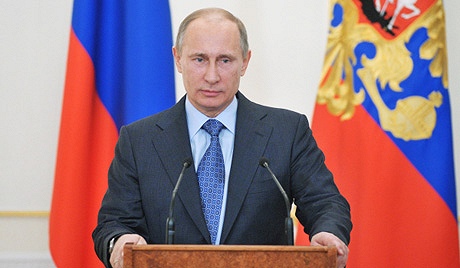
From Sergei Karaganov, Russia in Global Affairs: The growing outright rivalry between the United States and China gives Russia more foreign policy weight, enabling it to assume the role of a balancer. So far it has been doing so rather skillfully. Today it may participate in a joint naval exercise with China that Beijing positions as outwardly anti-American. But tomorrow it can team up with the naval forces of the Old World and its allies for same sort of exercize in the Pacific. As for the multi-lateral political battle for islands among China, Japan, South Korea, Vietnam, the Philippines and the United States, Moscow prefers to stay aloof. But, I suspect, some of its diplomats must be grinning with pleasure.
The Pacific will be the center of world politics and geopolitical rivalry for ten years to come. Possibly, towards the end of the decade India’s growth and a series of wars in the Middle East may cause this center to drift towards the Indian Ocean. And in 10-15 years from now all this rivalry, overpressures on traffic arteries and expanding demand for raw materials will inflate the geopolitical importance of the Arctic, its Russian sector in particular. Some sort of virtual shadow competition for the region is already underway. Russia is in the lead, for it was the first to have laid claim to yet-to-be-discovered hydrocarbon deposits in the region. The main argument is purely geographic. Along Russia’s Arctic coast there runs a potential supply route that may offer competition to those crossing the Indian and Pacific oceans – the Northern Sea Route. At this point it is navigable only as far as Norilsk. Time is ripe for activating its Eastern section.
And, of course, Russia may derive mammoth benefits from the economic boom in the Asia-Pacific region. But one has to acknowledge in sad amazement it is still unable to tap this resource, which offers tremendous development opportunities for the Trans-Baikal region and the whole of the country. The laying of new gas pipelines towards the Pacific Ocean is possibly the sole exception.
Russia has held the APEC summit, improved infrastructures in Vladivostok. Fine. But what’s next? A comprehensive regional development strategy is still nowhere in sight. As for the proposals that have been made, they look so much like the daydreams of the late Soviet era that make me only cry out of self-pity.
Clearly, geopolitics and the new world economy require a marked growth of attention to Russia’s East. But this policy should to be based not on geopolitical calculations alone, however important these may look. It would be stupid to succumb to frustration at the moralizing of the Europeans and petty intrigues by the Brussels bureaucracy to turn our backs on Europe. First, such a move would spell neglect of all the very best and advanced that we still have. For many centuries – from the time of Byzantium and, in particular, over the past 300 years – the economic, social and cultural modernization came from Europe. Abandoning this asset would be tantamount to abandoning ourselves. Secondly, Europe, at least a smaller part of it, may rally around Germany to gain a second wind. The way Europe and its Nordic allies ruined Cyprus to teach all southerners a good lesson makes one hopeful.
Sergei Karaganov is Honorary Chairman of the Presidium of the Council on Foreign and Defense Policy and Dean of the School of World Economics and World Politics at the National Research University–Higher School of Economics. (photo: RIA Novosti)
Image: ria%206%2025%2013%20Putin.jpg
